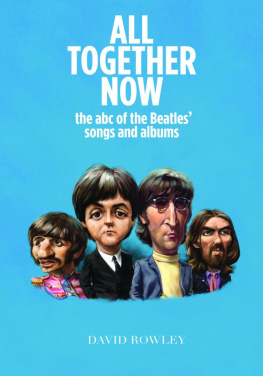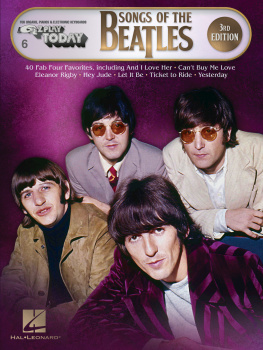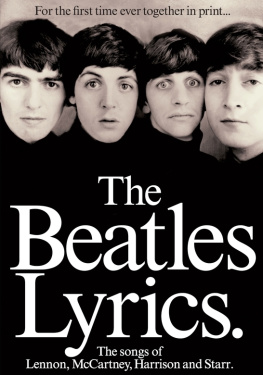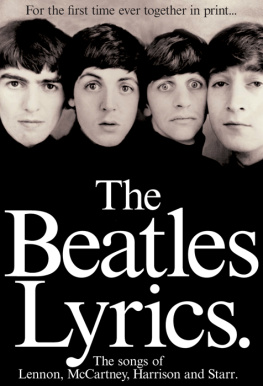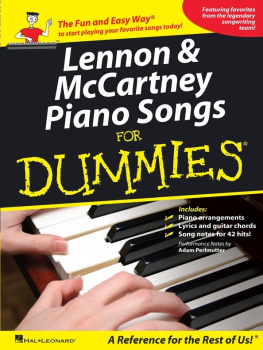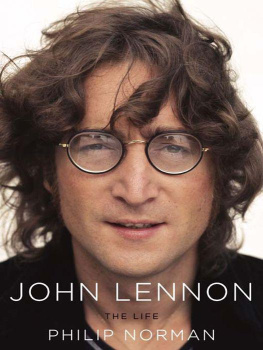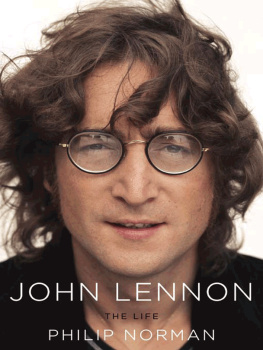David Rowley was born the same week the Beatles second album was released. He attended Central Foundation Boys School, London and Keele University. He began writing his first Beatles book in 1991 which became Beatles For Sale, 2002 and was followed by Help! 50 songwriting, recording andcareer tips used by the Beatles, 2008. He lives in London and works as a journalist.
Copyright 2013 David Rowley
The moral right of the author has been asserted.
Apart from any fair dealing for the purposes of research or private study, or criticism or review, as permitted under the Copyright, Designs and Patents Act 1988, this publication may only be reproduced, stored or transmitted, in any form or by any means, with the prior permission in writing of the publishers, or in the case of reprographic reproduction in accordance with the terms of licences issued by the Copyright Licensing Agency. Enquiries concerning reproduction outside those terms should be sent to the publishers.
Extracts from Paul McCartney: Many Years From Now by Barry Miles, published by Secker & Warburg. Reprinted by permission of
The Random House Group Limited
Matador
9 Priory Business Park,
Wistow Road, Kibworth Beauchamp,
Leicestershire. LE8 0RX
Tel: (+44) 116 279 2299
Fax: (+44) 116 279 2277
Email:
Web: www.troubador.co.uk/matador
ISBN 978 178088 440 0
British Library Cataloguing in Publication Data.
A catalogue record for this book is available from the British Library.
Typeset by Troubador Publishing Ltd, Leicester, UK

Matador is an imprint of Troubador Publishing Ltd
Printed and bound in the UK by TJ International, Padstow, Cornwall

For Simon Wenman and Simon Glass whom I first
played guitar with.
The Beatles stand up to scrutiny. The longer and closer one listens, the more complex and talented they emerge. Attempts to find an Achilles heel, to find them failing in some aspect, are either fruitless or negligible.
Whilst others have equalled them sporadically, none has the same duration or rate of output. Analysis of why this is so is neglected. Yet for anyone who has been entranced by popular music, and who has learnt guitar, written songs, formed a group, played live, recorded, however modestly, this should be a fascination. What is their formula?
The best explanation lies in the period between August 1960 and December 1962, when they were probably the hardest-working musicians in the world. On their first trip to Hamburg, aged 17-19, they played sometimes eight hours a night so hungry were they to become professional musicians a feat only the young and naive would attempt. The hours were driven by demand. The city had a tolerant attitude to prostitution and strip shows which made it a magnet for sailors and thrill-seekers alike, which in turn created demand for a surfeit of bars and nightclubs and an appreciation for frenzied rock n roll. In this rarefied environment, they were given accommodation and just enough money for food, clothing and guitar strings, in return for playing cover versions of US hits six days a week, an opportunity that has been rarely seen since. One might liken it to a rock n roll stage school.
In Hamburg they regularly played to people who knew little of them, while in Liverpool and its surrounds, there were also many one-night stands. To survive they learnt how to win over unfamiliar audiences and how to stay one small step ahead of expectations.
Uppermost in their skills was the use of vocals. With all the group contributing backing vocals, this added a layer of sound similar to the chords played on an electric organ giving a more versatile sound than the average guitar group, while John and Pauls mix of octaves brought an operatic sense of story-telling and contrast.
They learnt the art of songwriting through playing between 300-500 cover versions live. This provided a host of ideas, tricks and lessons from which to draw. Some of this was subconscious, so numerous were their hours clocked up on stage, some of it not so. George Harrison once claimed that if you named him any Beatles song, he could tell the record upon which it was based. John, who stole records, a guitar, an amplifier and a harmonica during these hungry days pre-fame, certainly lost no sleep over re-working someone elses tune. He once mischievously explained that he would take anothers song and change it to the point where he could not be sued. However, Georges claim served as a dig at his band-mates, whose status soared while he worked with less ego and ambition. Paul, for example, claimed no knowledge of the origin of Yesterday and John, likewise, for Across the Universe. Indeed, the songs they covered much of them 1950s rock n roll only partly explain their craft. These typically use three or four chords, unlike the five, six or seven of a Lennon/McCartney composition. The odd chord change (Del Shannons Runaway) or an arrangement (Maurice Williams and the Zodiacs Stay), was copied, but there was always some thrilling, inexplicable alchemy added.
Lyrically, too, there is a disconnect between these songs and their own work. The 300 cover versions documented by Mark Lewisohn in The Beatles Recording Sessions, are peppered with clichd gambits about heartbreak, true love and dances. When Lennon/McCartney replicated this, it tended to come with a twist. The cheeky smut hidden amid the endearments on their first big hit, Please Please Me, mocks any traditions it borrows from. The rhymes of She Loves You and Cant Buy Me Love are over-familiar, but the way they are directed at a third party in a celebratory tone, as if a community message, shifts the love song from personal to universal. This follows no obvious precedent, certainly none found in rock n roll. While naturally bold they were also a product of the 1960s, a period prosperous, confident and open to change after years of austerity. The utopian visions, the cheeky phrases and references to mind-expanding drugs would not have been publicly acceptable a decade before.
The list of attributes derived from playing nightly is lengthy and an expectation as a covers band to keep up with the latest hits and to follow their audiences tastes is another factor in their success. It goes some way to explaining their constant evolution and ability to stay up to date, whether it was the Latin rhythm on P.S. I Love You or the heavy metal of I Want You (Shes so Heavy). Such demands too gave them a work ethic that helped them respond to their onerous contract for an album every six months. One of their best, Rubber Soul, was written and recorded in the space of two months. John, in his solo career, took the process to its ultimate extent with Instant Karma, a song written and recorded in one day.
Intense and prolonged training explains much of what made the Beatles great but not everything. In his book The Outliers, Malcolm Gladwe ll uses the Beatles as an example of what he has termed the 10,000 hour rule, which states practising for this long will lead to success. However, the rule is probably best applied to fellow Liverpudlian bands, The Searchers and Gerry and the Pacemakers, for whom training overcame limited ability. Long hours can produce success, but it is not the only explanation for what made the Beatles special.
John was an extraordinarily coherent communicator and the directness of his lyrics has few precedents. His articulate summary of his deepest thoughts is seductive and precious unlike the disposable sentiments of most pop. A troubled childhood was one trigger in his need to connect with others and find love, whilst his dyslexia appeared to go hand in hand with compensatory intellectual skills as recent research of the condition suggests.
Next page
